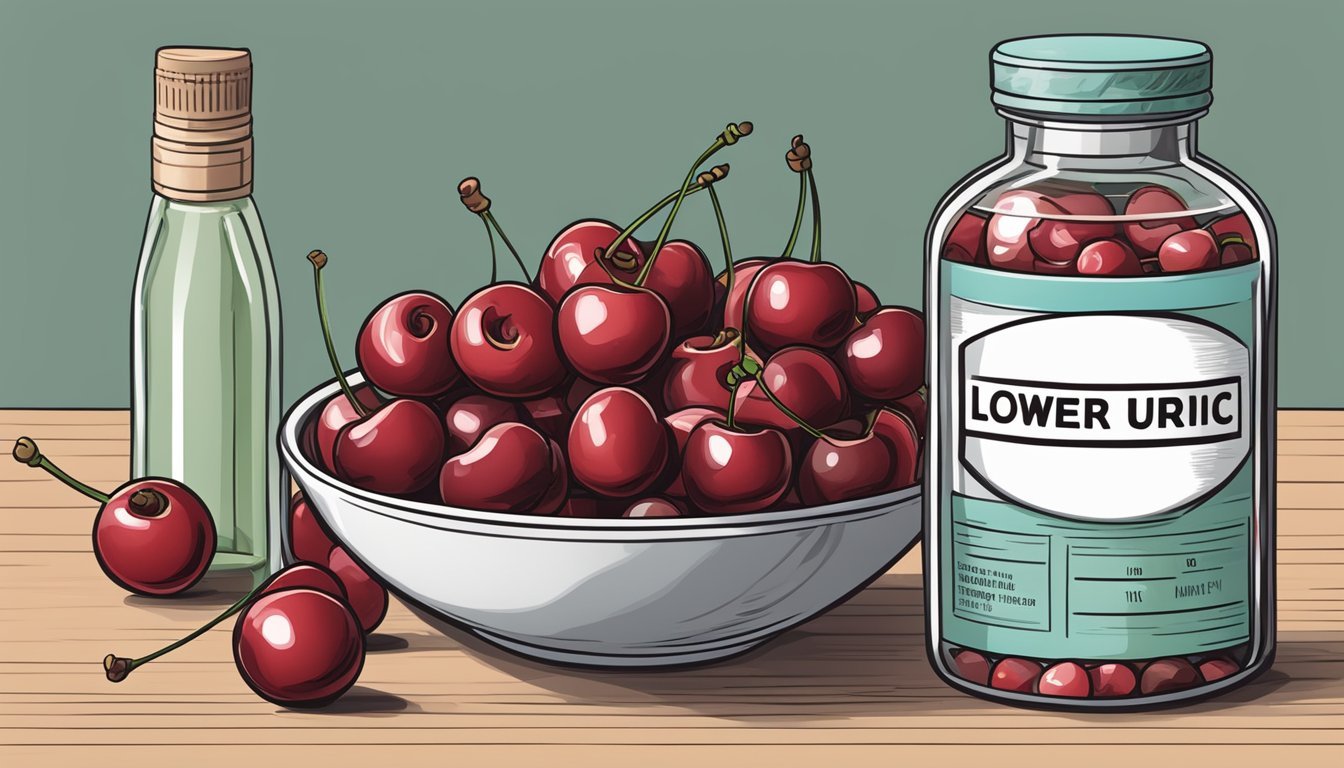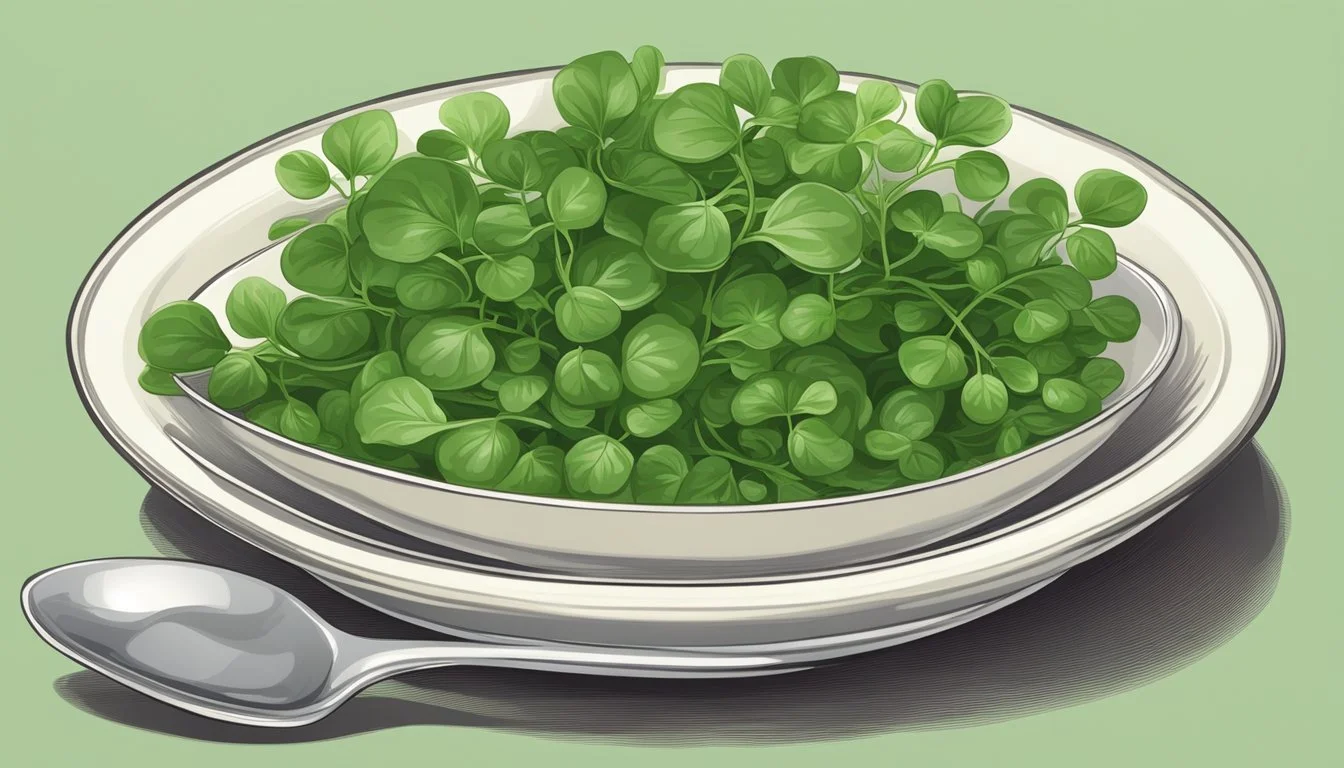Powerful Foods That Naturally Lower Uric Acid Levels
Managing uric acid levels is essential for those looking to mitigate the risks associated with gout and other related health issues. Diet plays a critical role in this management, as certain foods can help to lower uric acid levels naturally.
Choosing the right foods can significantly reduce uric acid, aiding in the prevention of gout attacks and promoting overall health. By understanding which foods to include and which to avoid, individuals can make informed dietary decisions to support their well-being.
1) Cherries
Cherries are a popular fruit known for their vibrant color and sweet flavor. They also offer health benefits, particularly in lowering uric acid levels.
Studies have shown that both sweet and tart cherry varieties can help reduce uric acid in the body. Consuming cherries regularly may decrease the frequency of gout attacks.
The anti-inflammatory properties of cherries contribute to these benefits. These properties help in reducing uric acid crystallization in the joints, a common issue for gout patients.
Research indicates that drinking cherry juice can be especially effective. An amount of 8 ounces of 100% tart cherry juice daily has been associated with significant reductions in serum uric acid levels.
Cherries can be easily incorporated into the diet. They can be eaten fresh, added to salads, or consumed as juice. This makes them a convenient option for those looking to manage their uric acid levels naturally.
2) Celery
Celery is a notable food for those aiming to lower uric acid levels. This vegetable contains compounds that may help in managing gout symptoms.
Celery acts as a natural anti-inflammatory, which can reduce the discomfort associated with gout attacks.
Another benefit of celery is its diuretic properties, which promote the excretion of uric acid through urine.
Celery also contains luteolin, a compound that may help lower uric acid levels and reduce inflammatory responses in the body. Including celery in the diet can be both beneficial and practical for those dealing with high uric acid.
Regular consumption of celery may provide a natural aid in managing uric acid levels and reducing the risk of gout flare-ups. This makes celery a versatile addition to a gout-friendly diet.
3) Apples
Apples may play a role in managing uric acid levels due to their nutritional content. They contain vitamin C, which has been associated with lower uric acid levels in the blood. Studies suggest that diets rich in vitamin C can help prevent gout attacks.
Moderation is key. While apples are generally low in purines, consuming them in large quantities could still affect uric acid levels indirectly. It’s important to include them as part of a balanced diet.
Apples also contain fiber, which supports overall digestive health. Including fiber-rich foods like apples can aid in weight management, reducing the strain on joints, which is beneficial for people with gout.
It's advisable to eat apples fresh and unprocessed. Fresh apples have the highest nutrient content compared to processed forms like apple juice or applesauce, which may contain added sugars and fewer nutrients.
4) Berries
Berries are a beneficial choice for those looking to lower uric acid levels. Dark-colored berries, such as cherries, blackberries, and blueberries, contain high amounts of anthocyanins. These compounds have anti-inflammatory properties and can help reduce uric acid levels in the blood.
Vitamin C is another important component found in many berries. Studies show that Vitamin C can increase uric acid excretion, helping to maintain lower levels in the body. Consuming berries like strawberries and raspberries can provide a good source of this vital nutrient.
Cherries, in particular, have been highlighted for their potential benefits in managing gout. Some studies suggest that cherries may help prevent gout attacks by lowering uric acid and reducing inflammation. People with gout might consider adding fresh or dried cherries to their diet.
In addition to their uric acid-lowering properties, berries provide various vitamins, minerals, and antioxidants. These contribute to overall health, making berries a wise inclusion in a balanced diet. Enjoying a variety of berries regularly can be both a tasty and healthful strategy.
5) Pineapple
Pineapple is a tropical fruit that contains bromelain, an enzyme known for its potential anti-inflammatory properties. This enzyme might help reduce inflammation and pain associated with gout flare-ups. Pineapple is also rich in vitamin C, which studies suggest may lower uric acid levels in the body.
Studies indicate that consuming vitamin C can help speed up the excretion of uric acid through the urine. Citrus fruits, including pineapples, provide a significant amount of this vitamin, making them a positive addition to a diet aimed at managing uric acid levels.
Pineapple can be enjoyed fresh, frozen, or canned (preferably in its juice rather than syrup). Adding pineapple to salads, smoothies, or even as a topping for yogurt can be a delicious and healthy way to incorporate it into your diet. It’s essential, however, to consume it in moderation as part of an overall balanced diet.
6) Bananas
Bananas are frequently recommended as part of a diet to manage uric acid levels. Rich in vitamin C, they help reduce the concentration of uric acid in the blood.
Bananas are considered low-purine foods. This quality makes them suitable for individuals aiming to control gout symptoms. Low-purine foods reduce the production of uric acid.
They are also high in potassium, which helps the body maintain proper fluid balance and kidney function. Healthy kidneys efficiently excrete uric acid, lowering its levels in the bloodstream.
Including bananas in your diet can provide a beneficial source of nutrients. They complement other low-purine foods in promoting overall health. Regular consumption can aid in minimizing gout flare-ups.
Bananas are easily incorporated into various meals. Eating them as snacks, adding them to smoothies, or topping cereals with banana slices are simple ways to enjoy their benefits.
7) Lemon juice
Lemon juice may help reduce uric acid levels in the blood.
Studies have shown that consuming lemon juice can be beneficial for those with high uric acid levels. A 2017 study indicated that freshly squeezed lemon juice, equivalent to one lemon per day, helped lower uric acid levels in adults.
The citric acid in lemon juice is thought to aid in this process. Citric acid can help dissolve uric acid, making it easier for the body to eliminate. This can be particularly useful for individuals suffering from gout, a condition caused by elevated uric acid levels.
Incorporating lemon juice into the daily diet is a simple practice. Adding it to water makes for a refreshing drink that can be consumed throughout the day. This approach not only hydrates but may also help manage uric acid levels.
Animal studies have also supported these findings. Research from 2015 and 2017 demonstrated positive effects on uric acid reduction when lemon juice was added to water. This natural remedy can be a useful part of a broader strategy to manage uric acid levels.
8) Watercress
Watercress is a leafy green vegetable known for its high nutrient content. It contains vitamins A, C, E, and K, as well as essential minerals like calcium, magnesium, and potassium. These nutrients can contribute to overall health and well-being.
Including watercress in a diet may help manage uric acid levels. Its high vitamin C content is particularly beneficial, as studies suggest that vitamin C can help lower serum uric acid levels. Eating watercress regularly might provide these benefits as part of a balanced diet.
Additionally, watercress contains fiber, which can aid in reducing uric acid levels by improving digestion and promoting satiety.
Incorporating watercress into meals is easy and versatile. It can be added to salads, smoothies, soups, and sandwiches, making it a practical choice for those looking to manage their uric acid levels through diet.
9) Green tea
Green tea is widely recognized for its numerous health benefits, one of which is its potential to lower uric acid levels.
The antioxidants present in green tea, particularly polyphenols and catechins, play a role in reducing inflammation and inhibiting the production of uric acid. These compounds help to manage the body’s uric acid levels more effectively.
Studies have shown that regular consumption of green tea can lead to a significant decrease in uric acid levels in the blood. This makes it a beneficial beverage choice for individuals looking to manage their uric acid levels naturally.
Adding green tea to a routine diet can be an easy and effective way to help keep uric acid levels in check. Drinking it daily, in moderate amounts, can contribute to better overall health and assist in the prevention of conditions related to high uric acid.
10) Tofu
Tofu, a soy-based product, is an excellent food choice for individuals looking to lower uric acid levels.
Tofu is made from soybeans, which are naturally low in purines. Purines are compounds that, when broken down, produce uric acid. By incorporating low-purine foods like tofu into the diet, individuals can manage uric acid levels more effectively.
Studies have shown that consuming soy products such as tofu does not significantly increase uric acid levels. This makes tofu a safe and nutritious option for people with gout, a condition characterized by high uric acid levels.
Tofu is also versatile and can be used in a variety of dishes, from stir-fries to salads. Its mild flavor allows it to absorb the flavors of the ingredients it is cooked with, making it a flexible ingredient in many recipes.
Including tofu in the diet can also provide additional health benefits, such as being a good source of protein and containing essential amino acids. This makes it a valuable addition to a balanced diet aimed at reducing uric acid levels.
Understanding Uric Acid
Uric acid is a natural waste product found in blood.
The body creates uric acid when it breaks down purines, which are substances found in some foods and drinks.
Purines are present in high amounts in certain types of meat, seafood, and alcohol.
When uric acid levels become too high, crystals form in the joints, causing gout.
People can check their uric acid levels through a blood test.
High levels might not always cause symptoms, but they significantly increase the risk of developing gout.
Reducing uric acid levels often involves dietary changes and lifestyle adjustments.
Limiting foods high in purines, such as red meat and certain seafood, can help.
Increasing water intake helps the kidneys flush out excess uric acid.
Additionally, certain foods and nutrients have been known to manage and reduce uric acid levels.
For instance, cherries, skim milk, and fiber-rich foods have shown positive effects.
Vegetables, nonfat milk, and plant-based protein sources are also beneficial.
Avoiding alcohol can help manage uric acid levels, especially beer and liquors.
Regular physical activity supports overall health, and maintaining a healthy weight reduces uric acid levels.
Monitoring changes and maintaining a balanced diet can significantly impact uric acid management.
Managing uric acid is crucial for those prone to gout or hyperuricemia.
Consulting with a healthcare provider for personalized advice is recommended.
Dietary Changes to Lower Uric Acid
Lowering uric acid levels through diet involves avoiding foods high in purines and incorporating foods that help reduce uric acid concentration. Specific dietary adjustments can make a significant difference in managing symptoms and preventing gout attacks.
Foods to Avoid
To help lower uric acid, it is essential to avoid foods high in purines. Red meats such as beef, lamb, and pork are particularly rich in purines and can increase uric acid levels. Organ meats like liver and kidneys should also be avoided.
Certain seafoods, including sardines, anchovies, and mackerel, are known to contain high levels of purines. Additionally, alcohol, especially beer, can lead to increased uric acid production, so limiting or eliminating alcohol intake can be beneficial.
Sugary foods and drinks, especially those sweetened with high-fructose corn syrup, can contribute to higher uric acid levels. Reducing the intake of such sweets and beverages is advisable. Avoiding these foods can help in managing uric acid more effectively.
Foods to Include
Certain foods can be beneficial in lowering uric acid levels. Cherries and cherry juice have been shown to help reduce uric acid and the frequency of gout attacks. Incorporating more fiber-rich foods, such as oats, whole grains, and vegetables, helps improve overall digestion and can lower uric acid.
Vitamin C-rich foods, including citrus fruits, bell peppers, and strawberries, may help decrease uric acid levels in the blood. Also, low-fat or fat-free dairy products, like yogurt and milk, are recommended for their potential uric acid-lowering effects.
Lastly, it is beneficial to drink plenty of water to help flush uric acid from the body. Staying hydrated supports the kidneys in excreting uric acid more efficiently.
Lifestyle Modifications
Making lifestyle changes can significantly help minimize uric acid levels and manage gout symptoms effectively.
One crucial aspect is dietary adjustments. Individuals should focus on consuming low-purine foods such as fresh fruits, vegetables, whole grains, and low-fat dairy products. Purine-rich foods like red meat, organ meats, certain seafoods, and alcohol should be limited or avoided.
Incorporating plenty of water into daily routines is beneficial. Hydration helps in flushing out excess uric acid from the body. Aim for at least 8-10 glasses of water each day.
Maintaining a healthy weight is equally important. Obesity is a known risk factor for increased uric acid levels. Regular physical activity, combined with a balanced diet, can aid in weight reduction, thus lowering the risk of gout attacks.
Reducing alcohol consumption is advisable. Alcohol, particularly beer, is high in purines and can contribute to elevated uric acid levels. Opting for non-alcoholic beverages or limiting alcohol intake can be helpful.
In addition, some foods might specifically help lower uric acid levels:
Cherries: Known for their anti-inflammatory properties.
Nonfat milk and low-fat yogurt: These dairy products may help lower uric acid.
Soy products: Plant-based proteins that are low in purines.
Implementing these lifestyle modifications requires consistent effort and monitoring. They significantly contribute to better management of uric acid levels and overall health. Remember, while these changes are beneficial, medication may still be necessary to fully control gout symptoms.
Nutritional Supplements
Certain nutritional supplements can help manage and reduce uric acid levels. These supplements can be a useful addition to dietary changes aimed at controlling gout.
Vitamin C:
Vitamin C may help lower uric acid levels.
A commonly suggested dose is 500 milligrams per day.
Cherries:
Cherries and cherry extract supplements are thought to lower uric acid levels and reduce inflammation.
Coffee:
Research indicates that coffee consumption may reduce serum uric acid levels. It competes with the enzyme that breaks down purines.
Omega-3 Fatty Acids:
Omega-3 supplements can reduce inflammation and have a beneficial effect on gout symptoms.
Bromelain:
Found in pineapple, bromelain supplements have anti-inflammatory properties.
Milk Thistle:
Milk thistle supplements could support liver health, aiding in the metabolism of substances that increase uric acid levels.
Folate:
Folate or folic acid supplements might reduce uric acid levels in some cases.
Combining these supplements with dietary adjustments and healthy lifestyle changes may provide significant benefits in managing uric acid levels and preventing gout flare-ups. Always consult with a healthcare provider before starting any new supplement regimen.





